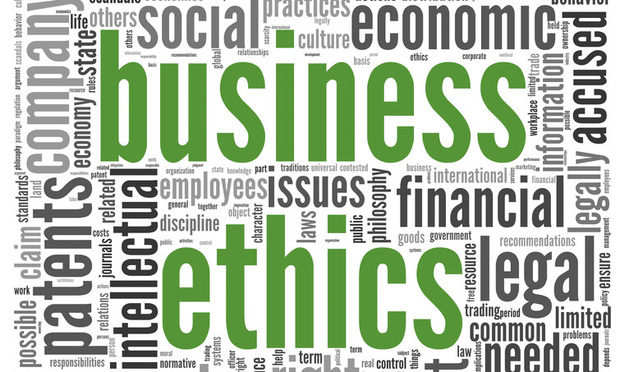When Your Client Offers You a Job, Consider These Rules
Whether an in-house attorney's “wages” fall within the definition of “fee” in Rule 1.5 (a) is debatable.
February 05, 2018 at 12:02 AM
5 minute read

 Jonathan Hawkins (Photo: John Disney/ALM)
Jonathan Hawkins (Photo: John Disney/ALM)After a number of years representing a business client, you have been asked to join the client as a full-time in-house counsel. You will soon be negotiating your salary, your bonus structure and other nonmonetary compensation, including stock or stock options. Going in, you need to keep in mind the Georgia Rules of Professional Conduct, which generally apply to in-house counsel in Georgia. There are three rules that may bear on your compensation package as in-house counsel.
Business Transaction With Client
Pursuant to Rule 1.8 (a), a lawyer should not enter into a business transaction with a client unless: (1) the transaction is fair and reasonable to the client and the terms are fully disclosed; (2) the client is advised about the desirability of seeking and given an opportunity to seek the advice of independent counsel; and (3) the client gives informed consent. All of this must be documented in writing.
If stock or stock options are part of the compensation package to in-house counsel, Rule 1.8 (a) may apply. See Ga. Formal Ethics Op. 05-2 (applying Rule 1.8(h)); Kaye v. Rosefielde, 432 N.J. Super. 421, 480, 75 A.3d 1168, 1204 (App. Div. 2013), rev'd on other grounds, 223 N.J. 218, 121 A.3d 862 (2015); but see Chism v. Tri-State Const., Inc., 374 P.3d 193 (Wash. App. 2016).
Whether Rule 1.8(a) applies depends on the underlying facts. Stock option compensation that is being offered as part of a larger, well-defined employee benefit plan is less likely to be treated as a business transaction under Rule 1.8(a) than if it is a unique offer being made solely to the in-house counsel. The more heavily negotiated by the lawyer and the less sophisticated the client, the more likely the Rule 1.8 (a) written disclosures and consent are necessary.
The role the attorney will play at the employer may also determine whether Rule 1.8 (a) applies. For example, if the lawyer is being hired solely in a business role, rather than in a legal capacity, then the employer is not a client and the rule would not apply.
When in doubt, the safest route would be to document the transaction as proscribed in Rule 1.8 (a) (i.e., obtain the client's written informed consent after fully disclosing the transaction and advising the client to seek the advice of independent counsel in writing).
Reasonableness of Compensation
Rule 1.5 (a) prohibits lawyers from agreeing to, charging or collecting an unreasonable fee. Typically, this rule has been used to prohibit fees that are much higher than justified by the work performed by the lawyer.
Whether an in-house attorney's “wages” fall within the definition of “fee” in Rule 1.5 (a) is debatable. Even assuming it does, the reasonableness of the wage component of an in-house lawyer's compensation package would be fairly easy to discern. And, if the client-employer set the salary, then it would probably be deemed reasonable on its face.
A thornier issue is any nonmonetary compensation. Even if reasonable when given, should stock or stock options subsequently rise dramatically, one might argue that the total compensation received by the attorney is too high and unreasonable under Rule 1.5 (a). Another timely example might be the in-house lawyer given 1,000 bitcoin when they were worth $15 each. If she cashed out in December 2017, she would have pocketed around $20 million.
Conflict of Interest
Rule 1.7 generally prohibits a lawyer from representing a client if there is a significant risk that the lawyer's own interests will materially and adversely affect the representation of the client. If a lawyer has a large stock or financial stake in a client, the lawyer's own personal interests may diverge with the client's best interest.
Imagine a scenario where a company must decide between two options that would affect its stock owners differently. The company is sitting on a large amount of cash. One option would be to declare a large dividend and pay the cash out to shareholders. Another option would be to use the money for long-term investments that may or may not pay off to the company and shareholders at some time in the future. If the in-house lawyer owns a large number of shares, his own needs or desires may improperly affect his advice to the company and might run afoul of Rule 1.7 (a). In such a situation, the best course would be for the in-house lawyer to have independent counsel advise the client.
Jonathan E. Hawkins is a partner in the Atlanta firm of Krevolin & Horst. He represents clients in numerous business sectors in high stakes, complex commercial litigation and serves as outside general, business and ethics counsel to lawyers and law firms.
This content has been archived. It is available through our partners, LexisNexis® and Bloomberg Law.
To view this content, please continue to their sites.
Not a Lexis Subscriber?
Subscribe Now
Not a Bloomberg Law Subscriber?
Subscribe Now
NOT FOR REPRINT
© 2025 ALM Global, LLC, All Rights Reserved. Request academic re-use from www.copyright.com. All other uses, submit a request to [email protected]. For more information visit Asset & Logo Licensing.
You Might Like
View All
Ga. Appellate Judges Mull Landlord Responsibility in Premises Liability Case Involving Child Shooting

Corporate Lawyer Accused of Extortion Pushes Back Against $3.7M Judgment
6 minute read

MetLife Attorney's Switch to Nelson Mullins Continues String of In-House Moves to Law Firms
3 minute readTrending Stories
- 1Two More Victims Alleged in New Sean Combs Sex Trafficking Indictment
- 2Jackson Lewis Leaders Discuss Firms Innovator Efforts, From Prompt-a-Thons to Gen AI Pilots
- 3Trump's DOJ Files Lawsuit Seeking to Block $14B Tech Merger
- 4'No Retributive Actions,' Kash Patel Pledges if Confirmed to FBI
- 5A Texas Lawyer Just Rose to the Trump Administration
Who Got The Work
J. Brugh Lower of Gibbons has entered an appearance for industrial equipment supplier Devco Corporation in a pending trademark infringement lawsuit. The suit, accusing the defendant of selling knock-off Graco products, was filed Dec. 18 in New Jersey District Court by Rivkin Radler on behalf of Graco Inc. and Graco Minnesota. The case, assigned to U.S. District Judge Zahid N. Quraishi, is 3:24-cv-11294, Graco Inc. et al v. Devco Corporation.
Who Got The Work
Rebecca Maller-Stein and Kent A. Yalowitz of Arnold & Porter Kaye Scholer have entered their appearances for Hanaco Venture Capital and its executives, Lior Prosor and David Frankel, in a pending securities lawsuit. The action, filed on Dec. 24 in New York Southern District Court by Zell, Aron & Co. on behalf of Goldeneye Advisors, accuses the defendants of negligently and fraudulently managing the plaintiff's $1 million investment. The case, assigned to U.S. District Judge Vernon S. Broderick, is 1:24-cv-09918, Goldeneye Advisors, LLC v. Hanaco Venture Capital, Ltd. et al.
Who Got The Work
Attorneys from A&O Shearman has stepped in as defense counsel for Toronto-Dominion Bank and other defendants in a pending securities class action. The suit, filed Dec. 11 in New York Southern District Court by Bleichmar Fonti & Auld, accuses the defendants of concealing the bank's 'pervasive' deficiencies in regards to its compliance with the Bank Secrecy Act and the quality of its anti-money laundering controls. The case, assigned to U.S. District Judge Arun Subramanian, is 1:24-cv-09445, Gonzalez v. The Toronto-Dominion Bank et al.
Who Got The Work
Crown Castle International, a Pennsylvania company providing shared communications infrastructure, has turned to Luke D. Wolf of Gordon Rees Scully Mansukhani to fend off a pending breach-of-contract lawsuit. The court action, filed Nov. 25 in Michigan Eastern District Court by Hooper Hathaway PC on behalf of The Town Residences LLC, accuses Crown Castle of failing to transfer approximately $30,000 in utility payments from T-Mobile in breach of a roof-top lease and assignment agreement. The case, assigned to U.S. District Judge Susan K. Declercq, is 2:24-cv-13131, The Town Residences LLC v. T-Mobile US, Inc. et al.
Who Got The Work
Wilfred P. Coronato and Daniel M. Schwartz of McCarter & English have stepped in as defense counsel to Electrolux Home Products Inc. in a pending product liability lawsuit. The court action, filed Nov. 26 in New York Eastern District Court by Poulos Lopiccolo PC and Nagel Rice LLP on behalf of David Stern, alleges that the defendant's refrigerators’ drawers and shelving repeatedly break and fall apart within months after purchase. The case, assigned to U.S. District Judge Joan M. Azrack, is 2:24-cv-08204, Stern v. Electrolux Home Products, Inc.
Featured Firms
Law Offices of Gary Martin Hays & Associates, P.C.
(470) 294-1674
Law Offices of Mark E. Salomone
(857) 444-6468
Smith & Hassler
(713) 739-1250






